Apigenin and its derivatives in breast cancer prevention and therapy: a review on bioavailability and recent developments
Q3 Pharmacology, Toxicology and Pharmaceutics
引用次数: 0
Abstract
Breast cancer has emerged as the most prevalent cancer and the leading contributor to cancer-related fatalities among women worldwide. The treatments directed at primary breast tumors have significantly advanced; however, those aimed at elusive micro-metastases have shown comparatively lower effectiveness. In this regard, bioactive compounds specifically flavonoids derived from plants have gained worldwide attention due to their potential in cancer chemoprevention and treatment. Among them, Apigenin (APN), a flavonoid rich in several fruits, vegetables, and herbs, has been studied extensively for its possible role in treating and preventing breast cancer. This review discusses APN and its derivatives anticancer activity, including their molecular mechanisms, therapeutic effects, and latest developments in improving bioavailability. The anti-proliferative, pro-apoptotic, anti-inflammatory, and antimetastatic activity of APN are mediated through signal transduction pathways such as PI3K/Akt, MAPK, and NF-κB. APN found to initiates apoptosis, suppresses cell proliferation, prevents cell cycle progression, and inhibits metastasis and angiogenesis in different breast cancer models, including triple-negative breast cancer (TNBC). Even though preclinical studies of APN are promising but the clinical use of it is limited due to its poor solubility, low bioavailability, fast metabolism, and low absorption. To address these limitations, researchers have created derivatives (such as methylated or glycosylated versions) with enhanced stability and activity, and nanoformulations such as liposomes, lipid nanoparticles, and micelles for improved solubility, degradation resistance, and targeted delivery. As a results, APN and its derivatives are highly promising for breast cancer prevention and treatment. More research on delivery systems and modifications of their structures is critical for improving their clinical effectiveness. Thus, the focus of this review is also on recent mechanisms of action, bioavailability problems, and formulation approaches for eventual clinical applications. The future needs to focus on clinical trials and combination therapy in order to maximize their therapeutic potential.
芹菜素及其衍生物在乳腺癌预防和治疗中的生物利用度及最新进展
乳腺癌已成为全世界妇女中最普遍的癌症和癌症相关死亡的主要原因。针对原发性乳腺肿瘤的治疗有了显著的进展;然而,那些针对难以捉摸的微转移的药物显示出相对较低的有效性。在这方面,从植物中提取的生物活性化合物特别是黄酮类化合物因其在癌症化学预防和治疗方面的潜力而受到世界各国的关注。其中,芹菜素(Apigenin, APN)是一种富含多种水果、蔬菜和草药的类黄酮,因其在治疗和预防乳腺癌中的可能作用而被广泛研究。本文综述了APN及其衍生物的抗癌活性,包括其分子机制、治疗作用以及在提高生物利用度方面的最新进展。APN的抗增殖、促凋亡、抗炎和抗转移活性是通过PI3K/Akt、MAPK和NF-κB等信号转导途径介导的。在包括三阴性乳腺癌(TNBC)在内的不同乳腺癌模型中,APN被发现可以启动细胞凋亡、抑制细胞增殖、阻止细胞周期进展、抑制转移和血管生成。尽管APN的临床前研究很有前景,但由于其溶解度差、生物利用度低、代谢快、吸收率低,其临床应用受到限制。为了解决这些限制,研究人员创造了具有增强稳定性和活性的衍生物(如甲基化或糖基化版本),以及纳米配方,如脂质体,脂质纳米颗粒和胶束,以改善溶解度,降解抗性和靶向递送。因此,APN及其衍生物在乳腺癌的预防和治疗方面具有很大的前景。更多的研究给药系统和其结构的修改是提高其临床疗效的关键。因此,本综述的重点还包括最近的作用机制、生物利用度问题和最终临床应用的配方方法。未来需要关注临床试验和联合治疗,以最大限度地发挥其治疗潜力。
本文章由计算机程序翻译,如有差异,请以英文原文为准。
求助全文
约1分钟内获得全文
求助全文
来源期刊

Phytomedicine Plus
Medicine-Complementary and Alternative Medicine
CiteScore
3.70
自引率
0.00%
发文量
178
审稿时长
81 days
期刊介绍:
 求助内容:
求助内容: 应助结果提醒方式:
应助结果提醒方式:


